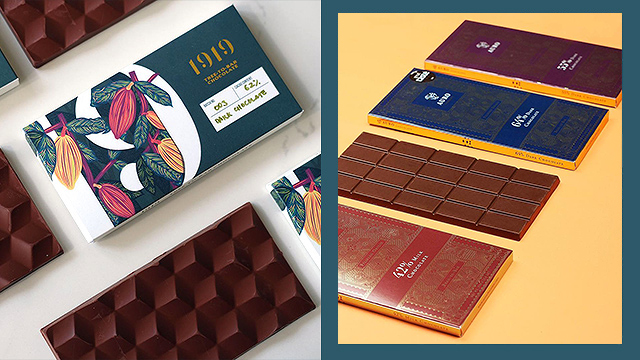
(SPOT.ph) For a lot of Filipinos—and for the longest time—good chocolate was synonymous with imported chocolate. This line of thinking is unfortunate not only for its colonial implications, but also considering the Philippines is home to some truly great cacao. Cacao in the Philippines has a long-standing history, having been brought in from Mexico as part of the Manila-Acapulco Galleon Trade in the 17th century. The Philippines is said to be able to grow all three main cacao types: Forastero, Trinitario, and even the Criollo, which is the most sought-after variety that is highly aromatic and lacking in bitterness.
The more popular way of working with cacao in the Philippines is still to turn it into tablea—the coarse, rustic tablets or balls of ground-up cacao beans used to make tsokolate—and there’s absolutely nothing wrong with that. In recent years, there has also been a rise in Filipino brands that make their own chocolate from scratch, using (and shining the spotlight on) our very own Filipino cacao beans. The trade model is called bean-to-bar, where the chocolate maker gets to control every step of the chocolate-making process. (While there is no official definition, this is what it's generally understood to mean.)
Briefly put, making chocolate entails selecting cacao beans, fermentation, drying, roasting, cracking and winnowing, conching, and tempering. Everything from the variety of cacao to the terroir (i.e., the climate, soil, and topography) where the cacao tree grows to the post-harvesting processes plays a role in the resulting flavor, mouthfeel, and aroma of the resulting chocolate. With this, some may choose to limit their beans to come from a certain region or farm (hence the terms single-origin or single-estate, respectively); some may even grow their own cacao (hence the term, tree-to-bar).
These special local chocolates show us just how distinctive cacao grown in our local landscape can be. As they source beans from different parts of the country, they also show us how diverse the flavors can be in the fruit—and thus, the resulting chocolate—depending on the environment it’s in. And of course, their high-quality (in some cases, even earning international accolades!) finished products show us what we Filipinos are truly capable of.
We shine the spotlight on these Filipino chocolate brands that make bean-to-bar chocolate:
Malagos Chocolate
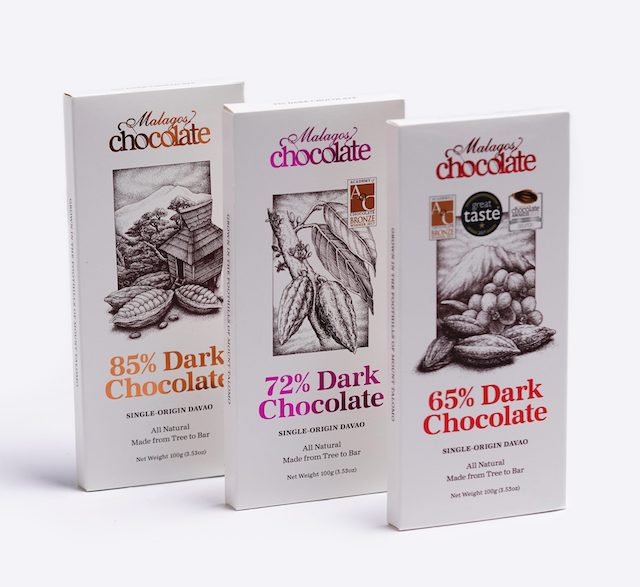
Malagos Chocolate was founded and is owned by the Puentespina family in Davao, where you can also find the Puentespina farm—their own cacao farm from where they source, grade, ferment, and solar-dry cacao beans to be used in their single-origin, tree-to-bar chocolate bars. The Puentespina farm has been designated as heirloom producers of quality and fine flavor cacao beans at origin by international cacao groups, too, so you know they have top-notch stuff! Their lineup includes dark chocolate of different cacao percentages—65%, 72%, and 85%—as well as 100% pure unsweetened chocolate that you can use for tsokolate or champorado (or consume by itself, if that’s your thing). With a long list of international awards from the International Chocolate Awards, Great Taste, Academy of Chocolate Awards and more, they’re definitely out to make a name for the Philippines in the global cacao and chocolate world.
See a list of Malagos Chocolate resellers in Manila. For more information, check out Malagos Chocolate’s website.
1919 Chocolate
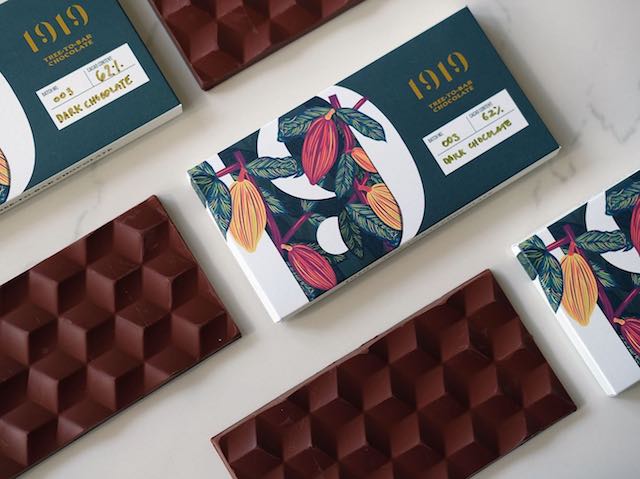
This family-owned, tree-to-bar chocolate brand makes chocolate with their own cacao from Malvar, Batangas. Partners Karl and Kay Santos became fascinated with the world of chocolate in 2019, when Kay brought home beans from her family’s century-old cacao farm in Batangas. They began making chocolate just for their family and friends, and soon established 1919 Chocolate upon everybody’s encouragement. Kay—a third-generation cacao farmer herself—takes care of the care and propagation of their Criollo cacao trees, while Karl directs and manages the chocolate-making process. Just some of the bars they make are the 56% Dark Milk Chocolate (P230), the London-based Academy of Chocolate-awarded 62% Tree-to-Bar Dark Chocolate (P230), and 70% Tree-to-Bar Dark Chocolate (P230). They’ve also got more playful bars like the 36% Toasted Milk and Strawberry (P230) and Dulce de Leche Chocolate (P230).
For orders and more information, check out 1919 Chocolate’s website.
Auro Chocolate
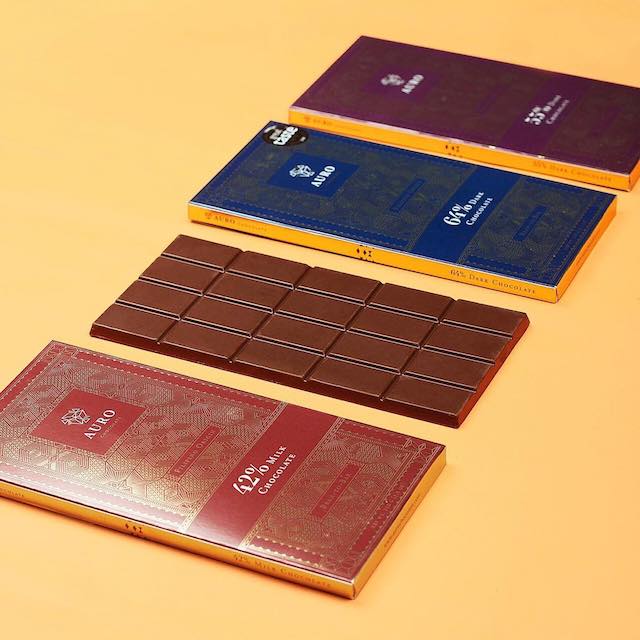
Auro Chocolate was founded in 2015 and launched in 2017, and has gone on to be one of the most well-known bean-to-bar brands locally. They make fine chocolate using cacao beans sourced straight from Mindanao farming partners, and make it a point to buy beans at higher prices to help farmers out. They’ve got a diverse range that includes the 55%, 64%, and 77% Dark Chocolates (P195/100 grams) as well as 50% Dark Milk Chocolate (P225/60 grams) and 42% Milk Chocolate (P195/100 grams). They’ve also got what they call the Reserve Collection, or single-estate chocolate bars that highlight the best cacao beans of a single harvest in specific areas of the country—as of writing, some of the bars available are the 85% Mana (P240/60 grams) and 70% Saloy (P225/60 grams). Occasionally, they’d also partner with other restaurants or artisans to make more “fun” and experimental chocolate bars, as they have in their previous Lesley Mobo and Serenitea collaborations. With quality chocolate and a sincere intention to help farmers out, it’s no wonder their list of international awards—which includes the likes of the Academy of Chocolate, Great Taste Awards, and International Chocolate Awards—only keeps getting longer every year.
For orders and more information, check out Auro Chocolates’ website.
Tigre y Oliva
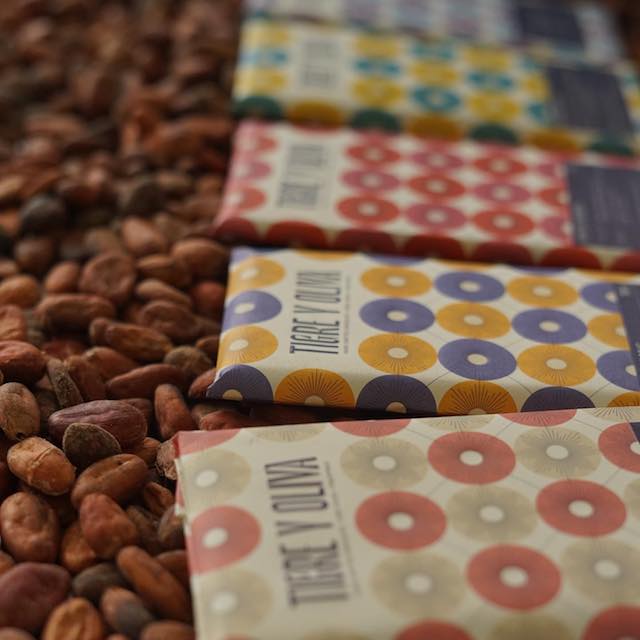
Tigre y Oliva was founded by Italian photographer Simone Mastrota, who recognized the great cacao we had in the Philippines and teamed up with Rob Crisostomo to learn the ropes of the bean-to-bar business. They highlight cacao from different parts of the Philippines by sourcing cacao from farming communities around the country and using chocolate-making techniques specific to their respective varieties. Some of the region-highlighting bars from their range are the 75% Sta. Maria, Davao (P250) and 85% Tupi, South Cotabato (P250). Don’t miss the one-of-a-kind Coconut Milk Chocolate (P180), either, where Philippine cacao’s robustness is given a creamy twist with coconut milk and an earthy sweetness with coconut sap.
For orders and more information, check out Tigre y Oliva’s website.
Theo & Philo
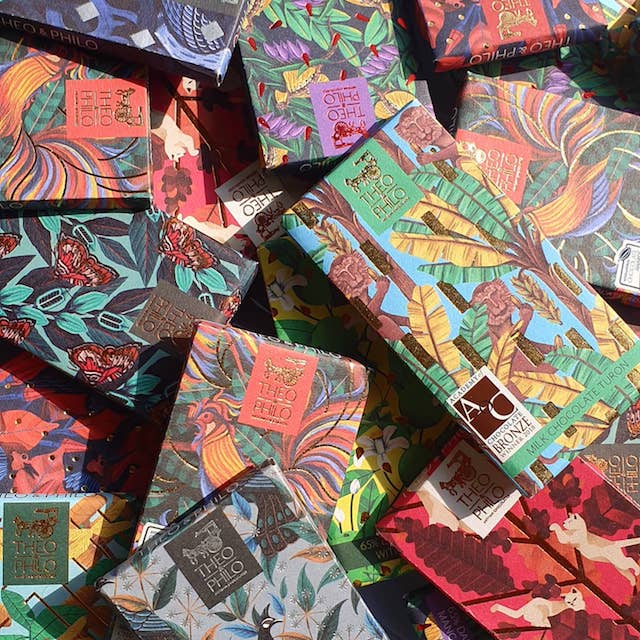
Theo & Philo is said to be the Philippines' first bean-to-bar chocolate brand, and they highlight cacao from Davao, sugar from Bacolod, and other local ingredients in making their one-of-a-kind chocolate bars. Aside from good ol’ 44% Milk Chocolate (P115/45 grams) and 70% Dark Chocolate (P115/45 grams), they’ve also got more creative (and distinctly Filipino) variants, including the 65% Dark Chocolate with Green Mango & Salt (P115/45 grams), Milk Chocolate Adobo (P115/45 grams), and Milk Chocolate Turon (P115/45 grams), that will show you just how diverse of a confection chocolate can be. Don’t just take our word for it; they’ve also been recognized on a global scale at the International Chocolate Awards and Great Taste awards.
For orders and more information, check out Theo & Philo’s website.
Hanan Chocolate
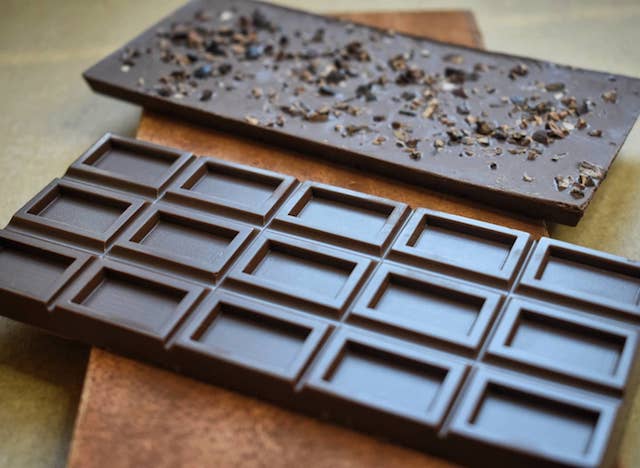
Founded by three college friends, Hanan Chocolate partners up with cacao farms in Benguet, Palawan, South Cotabato, and Davao to craft up chocolate that highlights the distinct flavors of Filipino cacao. Their name means “diwata ng umaga”, and they’re out to shed light on what Philippine cacao’s got to offer. Their chocolate bars each highlight a different region—for instance, there’s the 72% Dark Chocolate (P200) with cacao from Benguet, the 70% Dark Chocolate (P200) with cacao from Palawan, and the 52% Dark Milk (P200) with cacao from South Cotabato.
For orders and more information, check out Hanan Chocolate's Instagram page.
Dekada Chocolates
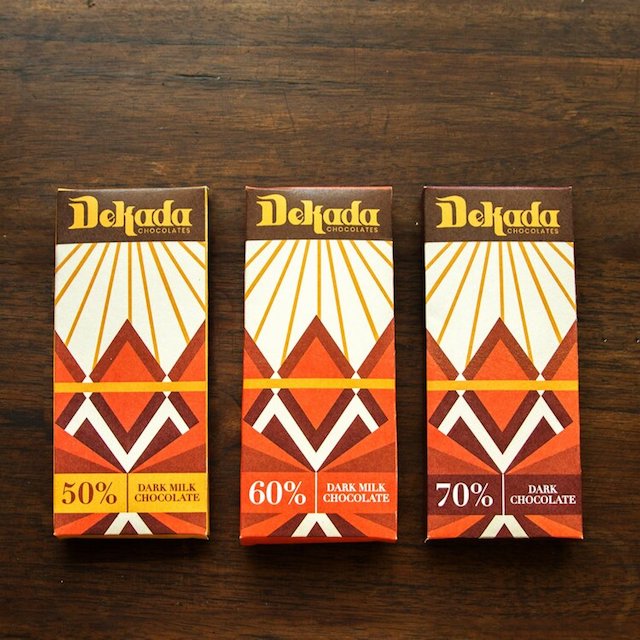
Dekada Chocolates is owned by mother-and-daughter tandem Angel and Gabbie De Guzman, both organic farmers who stumbled upon a “peculiar-looking” tree while exploring their farm and discovered it to be a cacao tree. From there, they decided to learn more about the chocolate-making craft—and today, they make their own chocolate bars right from their own home kitchen! Dekada sources their cacao from their mentor in Batangas, who sources beans from cooperatives in Davao and Batangas. They’ve got everything from chocolate bars (P100) in 50% Dark Milk Chocolate, 60% Dark Milk Chocolate, and 70% Dark Chocolate variants; Chocolate Triangles (P375/500-gram tub, P750/kilogram); and Tableya Rounds (P400/500-gram tub).
For orders and more information, check out Dekada Chocolates’ website.
Lerio Chocolates
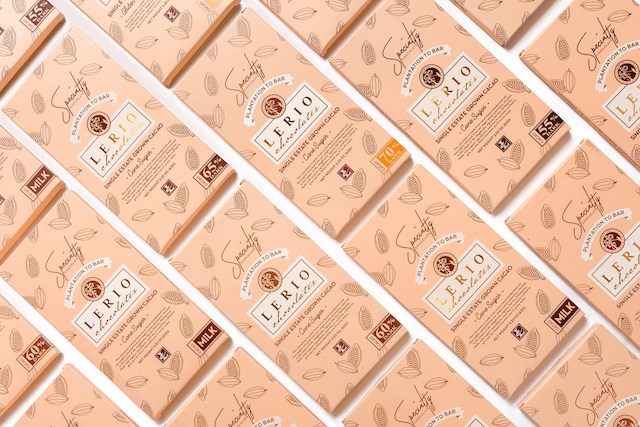
Started in 2019, Lerio is a plantation-to-bar chocolate venture owned by three women, and that grows and processes single-estate grown cacao from Rosario, Agusan del Sur. Their mission? To bring Philippine chocolate and chocolate products into the global spotlight “while promoting good farming practices and sustainability”. They source their cacao from their own partner farm in Rosario, VPO Farms and Eco-Reserve, which goes for sustainable farming practices and is part of a wide reforestation project. Lerio Chocolates leased some land from local farmers, and some land areas among which are part of the Ancestral Domain Areas of the Manobo Tribe in Agusan del Sur. “Aside from utilizing their land, we also in turn protect it and provide livelihood to the people of the tribe,” Lerio Chocolates shares in an exchange with SPOT.ph. Their lineup includes Milk Chocolate (P155) and Dark Chocolate in 55% (P150), 60% (P150), 65% (P150), and 70% (P150) cacao percentages, sweetened with cane sugar, though they’ve got sugar-free versions, too. Occasionally, they also sell seasonal chocolate treats like bonbons, truffles, and more.
For orders, fill out this order form. For more information, check out Lerio Chocolates’ Facebook page.
Hiraya Filipino Bean-to-Bar Chocolates

Hiraya is both a bean-to-bar chocolate brand and a social enterprise. Owner Arvin Peralta works with the local community in Malabog, Davao, where he also sources cacao for use in their chocolate bars. Purists can go for their 72% Single Origin Dark Chocolate Davao (P200/70 grams), but if you’re up for a flavor adventure, you can also try their Dark Chocolate with Queso de Bola (P200/70 grams) or Dark Chocolate with Chicharon (P200/70 grams) bars.
For orders and more information, check out Hiraya Chocolates’ Facebook page.
Kablon Farms
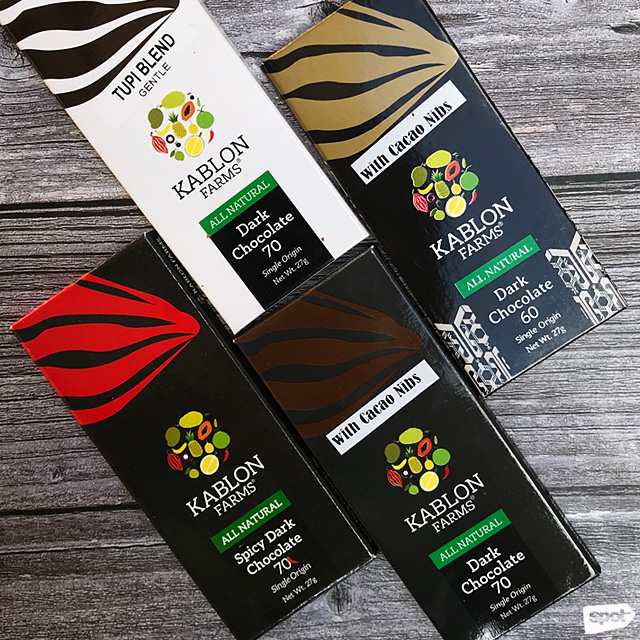
Kablon Farms has been around since the early 1960s. They started making their own tablea in the late '60s, and by the early 2000s, they started making their own chocolate as well. At present, they source wet cacao beans from nearby farmers from their home base in Tupi, Cotabato, which they ferment and then dry themselves using all-purpose solar dryers. For the fermentation step, Kablon Farms consulted a European fermentation scientist in coordination with Estela Duque of U.K.-based venture Moulinet Chocolat to develop fermentation protocols that bring out the best flavor profiles from the beans. Kablon Farms’ chocolate lineup includes dark chocolate in 60% and 70% cacao percentages, available with cane or coco sugar; they make spicy versions of these bars as well for those who like their chocolate with a kick. Kablon Farms also grows their own organic-certified, dried and fermented cacao beans—though is mostly reserved for export and the local artisanal-chocolate market.
For orders, check out Kablon Farms’ Shopee page. For more information, visit Kablon Farms Food Products’ Facebook page.
Cacao de Davao
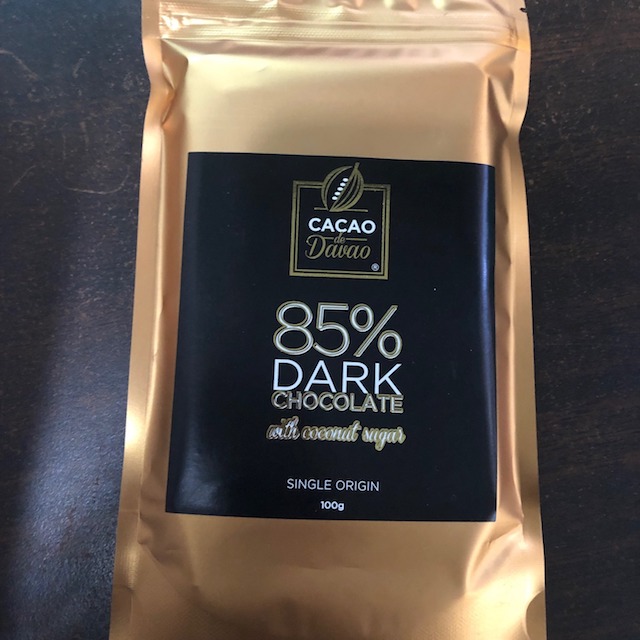
As the name implies, Cacao de Davao highlights cacao harvested and sundried from Davao in their single-origin chocolate bars. They buy from local farmers to support the local industry, and involve themselves in each and every step of the chocolate-making process. They’ve got plain Dark Chocolate with Coconut Sugar (P180/100 grams), 50% Milk Chocolate with Cacao Nib Brittle (P180/100 grams), and White Chocolate (P180/100 grams)—but don’t miss their fun dark chocolate variations, which include the Chili (P180/100 grams), Calamansi (P180/100 grams), and Mint (P180/100 grams), as well as the Mango Strips Dipped in 70% Dark Chocoolate with Coconut Sugar (P180/100 grams). Cacao de Davao’s products are available at selected Kultura shops in the Metro, but you can also send them a message on Facebook to get your orders shipped to Manila from Davao.
For orders and more information, check out Cacao de Davao’s Facebook page.
Dalareich Chocolate House
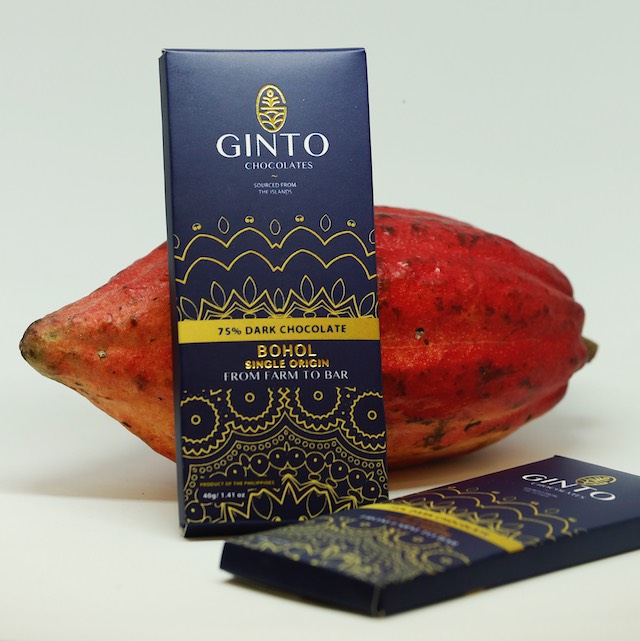
Hailing from Bohol is Dalereich Chocolate House. Their story begins with Dalareich Food Products, a small family business in the ‘90s owned by the Polot family, and that manufactures tablea. Daughter Dalareich Polot had the aim of helping her parents by making bean-to-bar chocolate using their homegrown cacao beans from the island province known as “God’s Little Paradise”, and this was fulfilled in 2014 as she became selected as a scholar to study at Cacaolab, Ghent University in Belgium. She launched sub-brand Ginto Chocolates upon returning to the Philippines. Also a social enterprise, Ginto Chocolates makes their bean-to-bar products from locally grown cacao trees planted by smallholder farmers from different small towns of Bohol. It’s also been hailed internationally, with their 100% Unsweetened Chocolate bagging a Gold Award at London’s Academy of Chocolate Awards in 2019. Their products are currently not available in Manila, but you can order them from their website if you find yourself in Bohol; some of the must-tries are the Ginto Chocolates 75% Bohol Single Origin (P160) and the aforementioned Gold Award Winning Unsweetened Chocolate (starts at P227.50/250 grams).
For more information, check out Dalareich Chocolate House’s website.
Plentitude Chocolate
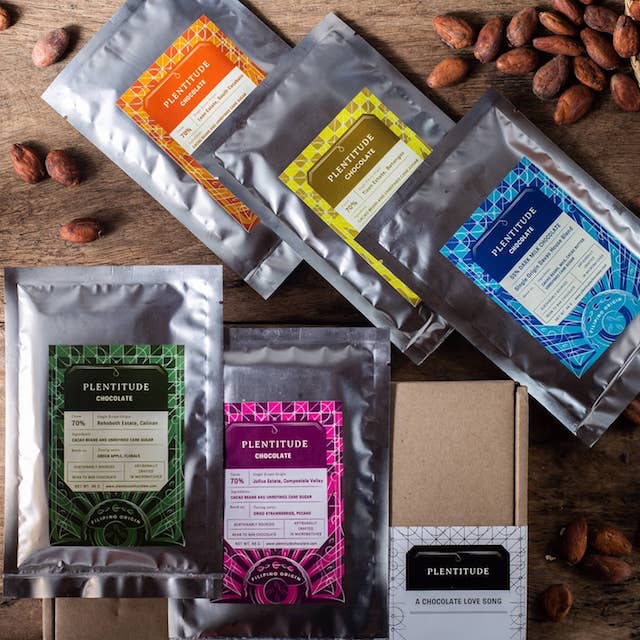
Plentitude Chocolate makes micro-batch, single-estate bean-to-bar chocolate with cacao from different parts of the country, shining the spotlight on their distinct flavors. You can try one of their single-estate dark-chocolate bars, like the Leon Estate, South Cotabato (P209/46 grams) or Tizon Estate, Batangas (P209/46 grams)—these are made with only two ingredients, namely cacao beans and unrefined sugar. You can also try the Dark Milk Bar (P209/46 grams) made with their single-origin Davao cacao blend, and using only the cacao beans, milk, and unrefined sugar.
For orders and more information, check out Plentitude Chocolate’s Facebook page.
Krone Chocolate
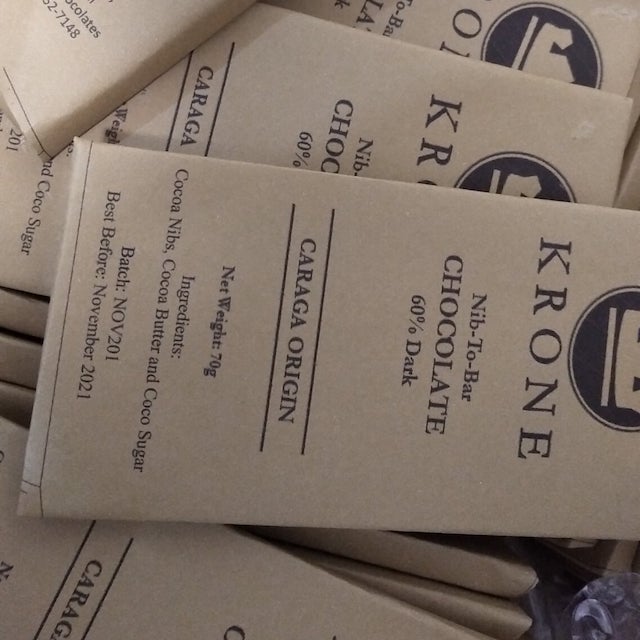
Krone Chocolate’s bean-to-bar chocolate bars highlight the distinctive flavors of cacao grown from different regions of the Philippines—right now they work with farmers from Davao, Aurora, Bohol, and Caraga. Owner Gabriel Santos and his brother started the enterprise in 2019, selling tablea, and soon ventured out to make their own chocolate. Their short-but-sweet range includes the Caraga 70% Dark (P200) and Caraga 60% Dark (P200), both of which have notes of chocolate, cream, caramel, and coffee; and the Aurora + Bohol 60% Dark (P200) with notes of chocolate, cherries, macadamias, and rum. Their bars all contain just three ingredients: cacao, cacao butter, and coco sugar. Santos is also currently establishing his own cacao nursery and cacao farm in Leyte; he admits the trees are still young at the moment, but he plans to source his beans from there in the future.
For orders and more information, check out Krone Chocolate’s Facebook page.
Theo & Brom
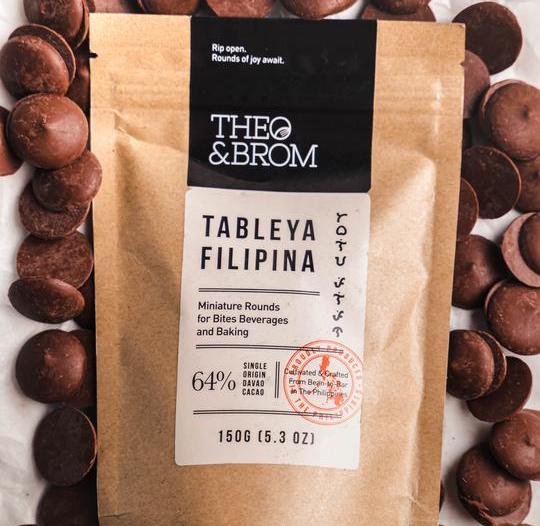
Filipino cacao meets the Belgian art of making chocolate at Theo & Brom, which makes what they call Belgian Tableya. These are essentially dark chocolate rounds made with Filipino cacao (specifically a single-region Davao cacao blend for their products in the Philippines, and a single-estate De La Serna cacao blend for their products in Belgium), which can be used in beverages, for baking, or even just for snacking on! Owner Marielle Moens found herself craving tsokolate when she moved to Belgium—and when she couldn’t find it, she and husband Matthias (who is Belgian) decided to make their own. They’ve consulted the experts—namely cacao adviser Dr. Zoi Papalexandratou, and Belgian chocolatier Mario Vandeneede—to assure their products are the best they can be. They’re making their mark overseas, too; for instance, their Belgian Rounds have recently been selected as customer rewards that are sent to clients by Eneco, one of the largest energy providers in Belgium.
For orders and more information, check out Theo & Brom’s website.
Gasa Chocolate
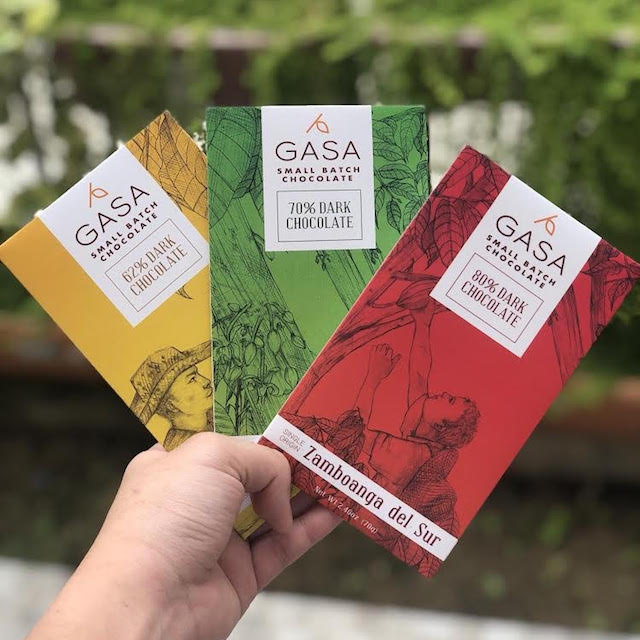
Based in Molave, Gasa Chocolate crafts up small-batch, bean-to-bar chocolate with cacao from Zamboanga del Sur—primarily from their family farm, but they’ve also started to source from other farms in the area. They’ve also begun to single origin beans from our partner farms in the neighboring provinces of Zamboanga del Norte and Sibugay. They make dark chocolate bars in 62% (P165), 70% (P170), and 80% (P180) cacao percentages, in packaging that showcases the farmers they work with. At the moment, they’re mostly only selling within the Zamboanga Peninsula, but do keep an eye out for them at expos and other pop-up events in the Metro.
For orders and more information, check out Gasa Chocolate’s Facebook page.
Cacao & Beyond
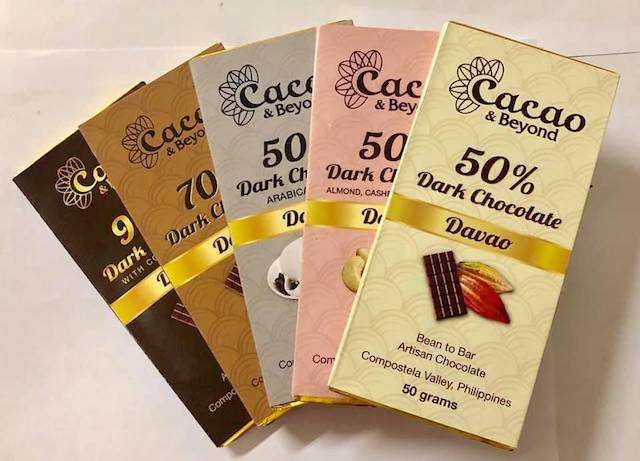
Tree-to-bar company Cacao & Beyond—a.k.a. the Comval Tropical Harvest Company, Inc.—hails from Davao, and is pretty much a jack of all trades as a cacao grower, cacao-bean trader, cacao processor, manufacturer, and artisanal chocolate maker. They make everything from 50% Milk Chocolate, 70% Dark Chocolate, and even 90% Dark Chocolate; you can also get bars with Arabica coffee, and Almonds, Cashews, and Cranberries.
For orders and inquiries, contact 0917-307-7647 or send an email to rfd@comvaltropical.com. For more information, check out Cacao & Beyond’s Facebook page.
Rosario’s Delicacies
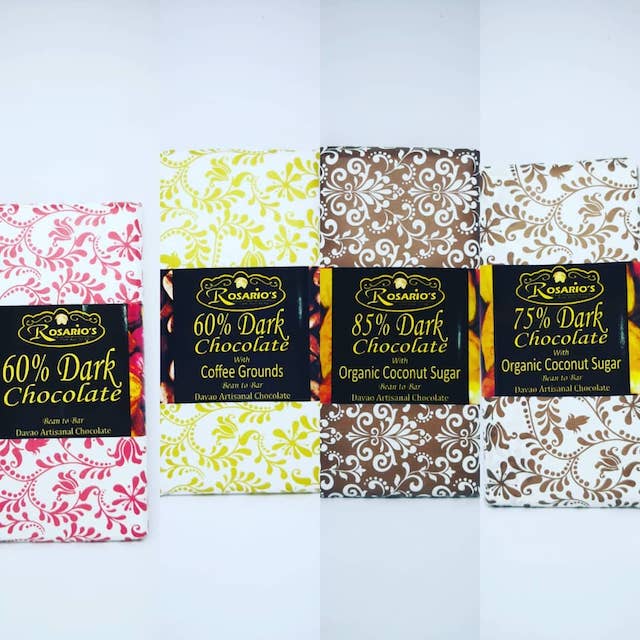
Davao-based company Rosario’s Delicacies has been around since 1978 and is known for their durian and cacao products—including their tree-to-bar chocolate bars. These use single-origin cacao from Davao and come in a couple of varieties, from 60% Dark (plain or with coffee) to 75% Dark with Organic Coconut Sugar to 85% Dark with Coconut Sugar. Fun fact: Their Tableya was awarded a star at the Great Taste awards in 2020!
For orders and more information, check out Rosario’s Delicacies’ Facebook page.
Risa Chocolates
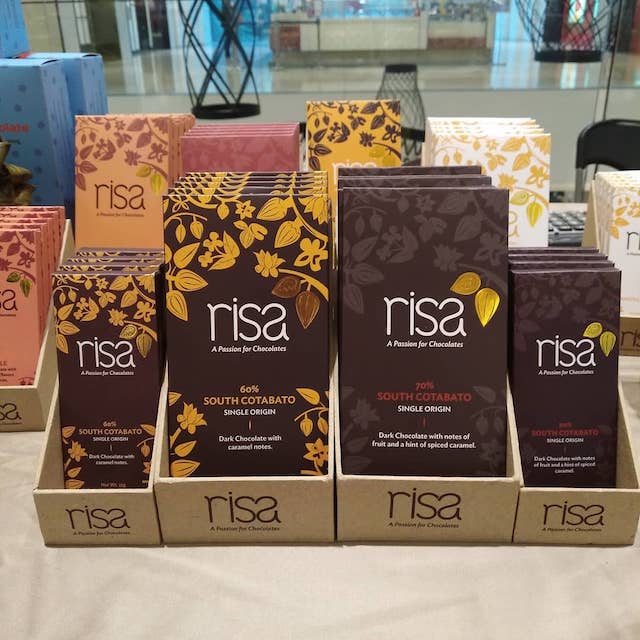
Risa Chocolates makes a variety of chocolate bars using cacao (specifically of the Trinitario sort, with Criollo roots) sourced from South Cotabato. Owner and CEO (that’s Chocolate Eating Officer) Pamela Cinco has her roots in baking, but started studying the chocolate-making craft around 2005 upon realizing that the country had great cacao but not a lot of Filipino-made chocolate brands. You can go for the dark and earthy 60% South Cotabato Dark Chocolate (P120/35 grams, P220/85 grams) or 70% South Cotabato Dark Chocolate (P120/35 grams, P220/85 grams), or go for their more contemporary bars like the Bacon Chili Chocolate (P130/35 grams, P230/85 grams), Pastillas de Pili (P130/35 grams, P230/85 grams), or Brown Butter Milk Choco Hazelnut (P130/35 grams, P230/85 grams).
For orders, fill out this order form. For more information, check out Risa Chocolates’ Facebook page.
[ArticleReco:{"articles":["85531","66133","85530","85522"], "widget":"Hot Stories You Might Have Missed"}]
Hey, Spotters! Check us out on Viber to join our Community and subscribe to our Chatbot.
Source: Spot PH
No comments:
Post a Comment